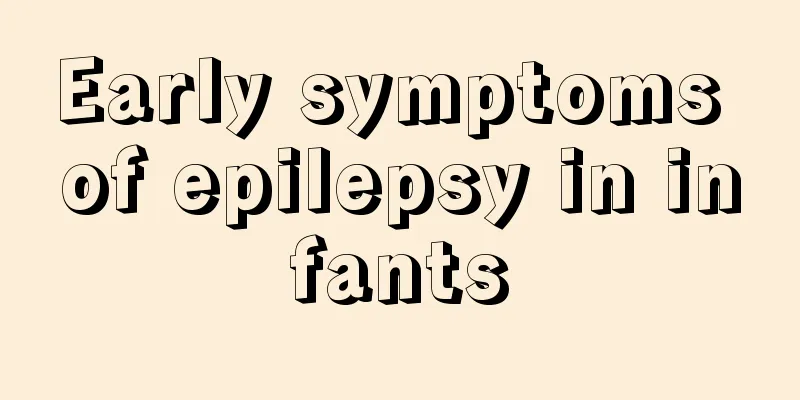What causes bloody stools in three-year-old children?

|
As babies grow, they will have problems of one kind or another. If the baby's stool is abnormal, it means that there is a problem with the baby's physical health, and parents need to pay attention to it. If the child has blood in the stool, it is likely caused by constipation or disease infection. Parents should take their children to the hospital for examination and treatment as soon as possible. Parents must usually let their children eat more foods high in dietary fiber. Causes of blood in stool in children 1. Digestive tract diseases are the most common cause of bloody stools, including esophageal varices, esophageal foreign bodies, ulcer disease, acute gastritis, gastric mucosal prolapse, intussusception, hemorrhagic necrotizing enteritis, strangulated intestinal obstruction, bloody stools in children, intestinal polyps, anal fissures, etc. 2. Blood diseases: neonatal hemorrhage, hemophilia, leukemia, aplastic anemia, thrombocytopenia and allergic purpura, etc. 3. Other systemic infectious diseases, such as sepsis, typhoid fever, etc., newborns swallowing blood from the mother's birth canal or ruptured nipples, swallowing of bleeding from the nose, pharynx, and gums, etc. 4. Influence of food or medicine. Certain foods and medicines can also cause changes in stool color, which can sometimes be confused with blood in the stool. For example, eating a lot of watermelon and tomatoes in the summer can make the stool turn red. The stool of children with anemia can turn black after taking iron supplements. The stool can also turn black after eating animal blood. These changes in stool color caused by food and medicine do not constitute bloody stools. Is blood in the stool a disease in children? Some parents often find that their children in kindergarten will have a small amount of bleeding after defecation. Most of the time, there is a little blood on the stool. Sometimes, when they wipe their buttocks, they find blood on the toilet paper, and it is all fresh blood. However, the child had no stomach or anal pain, and his appetite, spirit, growth and development were all normal. A blood test at the hospital showed no anemia. Firstly, there is not much bleeding during bowel movements, there is no pain in the stomach and anus, the stool is not too watery nor too dry, and bowel movements occur once a day, so it certainly does not seem like there is any acute disease. Although the child has bloody stools for many years, it does not affect his life, activities, nutrition, and development. Blood tests also show no signs of anemia, indicating that it does not harm his health. At this time, parents do not need to panic, because such bloody stools are not serious and will not affect the child's health. So, what exactly causes the bleeding? Is this a disease? It is safe to say that this is not a disease. It turns out that in order to resist the invasion of bacteria and viruses, young children's lymphatic tissue proliferates actively throughout the body, and the lymphatic tissue in the rectum, colon and even the lower small intestine gathers into clusters (called lymphoid follicles). Some lymphoid follicles are larger, protrude from the intestinal mucosa, and are arranged neatly and closely. The more protruding follicles near the end of the rectum (i.e. the anus) are squeezed by the friction of feces and the contraction of the intestinal wall, and a small amount of bleeding often occurs, which sticks to the feces and even flows to the anus. This is why young children occasionally have blood in their stools. Since the amount of bleeding is small, the body can compensate on its own, so it will not cause anemia. But some parents are very worried when they see blood in their children's stools, thinking that it is the same as women's menstruation. In fact, the amount of blood in a child's stool is far less than the amount of menstrual blood in a woman, so there is no need to worry at all. If the blood test proves that you do have anemia, taking some blood-enriching medicine will be enough. Because lymph follicle hyperplasia is a manifestation of the gradual maturation of children's immune function. As the immune function matures, lymph follicle proliferation gradually decreases and bleeding stops naturally, so no treatment is required. Some children will have bleeding, infection and granulation tissue growth due to abrasion of the proliferating lymph follicles. Excessive proliferation of granulation tissue forms small fleshy balls that protrude into the intestinal cavity, which are polyps. Polyps are more likely to be squeezed, so your child may have blood in his stool every time. But anyway. The bleeding will not be excessive, the child will not feel anything when defecating, and it will not become malignant. This type of polyp is medically called "juvenile polyp". If the doctor finds polyps in the child during rectal examination, he can pick them off. If the fingers cannot reach them, there is generally no need to deal with them, because as the polyps grow larger, the pedicles at the roots will become thinner and thinner. After the polyps fall off naturally, they will be discharged with the stool and will not bleed again. Some large polyps are stubborn and do not fall off. They can be removed through proctoscopy or sigmoidoscopy. |
<<: A three-year-old boy sweats a lot when sleeping?
>>: What should I do if my three-year-old child has a high fever?
Recommend
What calcium supplements are good for a five-year-old child?
If you want to supplement your child's calciu...
Why does my baby eat less milk?
During the breastfeeding period, you need to pay ...
How to treat acute pharyngitis in babies
As parents, we are most reluctant to see our babi...
What is the cause of excessive vaginal discharge in children?
Nowadays, female friends are prone to gynecologic...
What to do if your child has a toothache and a swollen face
For children, the most common cause of toothache ...
What should children eat if they have a long cough?
Children's long-term cough cannot be cured. F...
What causes children to twitch while sleeping?
Parents should pay more attention to their childr...
Why does the child not sleep and keeps crying?
It is an abnormal situation for children to not s...
What is the reason for children's frequent nasal congestion and runny nose?
Nasal congestion and runny nose are common sympto...
Children with poor coordination
There are many children who have limb incoordinat...
What to do if your baby has blisters on his palms
The most likely cause of blisters on the baby'...
Why are baby's eyes red?
There are many parents who are particularly worri...
The child has red spots on his throat
Because the throat is an important part of the up...
How to give Yinzhihuang to babies
Most babies will show yellowing signs on their bo...
Stages of baby's gastrointestinal development
As we all know, a baby's stomach and intestin...









